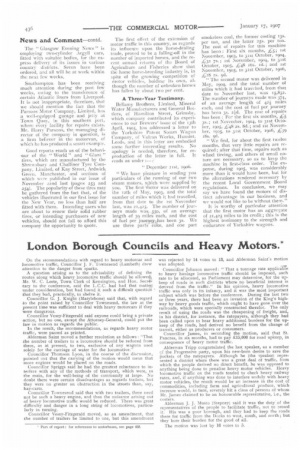London Borough Councils and Heavy Motors.*
Page 18

If you've noticed an error in this article please click here to report it so we can fix it.
On the recommendations with regard to heavy motorcar and locomotive traffic, Councillor J. F. Townesend (Lambeth) drew attention to the danger from sparks.
A question arising as to the advisability of defining the routes along which heavy locomotive traffic should be alloweek, Mr. W. C. Leete, Town Clerk of Kensington, and Hon. Secr4-e tary to the conference, said the L.C.C. had had that matter,. under consideration, but had found it such a difficult question that they had, practically, to shelve it.
Councillor G. J. Knight (Marylebone) said that, with regard .to the point raised by Councillor Townesend, the law at the present time was sufficient to deal with heavy motorcars if they were dangerous.
Councillor Vesey-Fitzgerald said anyone could bring a private action, but no one, except the Attorney-General, could put the law in motion as regards the public.
In the result, the recommendations, as regards heavy motor traffic, were passed as printed.
Alderman Saint moved a further resolution as follows : "That the number of trailers to a locomotive should be reduced from three, as at present, to two, exclusive of any wagons used solely for the carriage of water for the locomotive," Councillor Thomson Lyon, in the course of the discussion, pointed out that the carrying of the motion would mean that more engines would be placed on the roads.
Councillor Spriggs said he had the greatest reluctance to interfere with any of the methods of transport, which were, In the main, for the well-being of the community at large. No doubt there were certain disadvantages as regards trailers, but they were no greater an obstruction in the streets than, say, hay-carts.
Councillor Townesend said that with two trailers, there need riot be such a heavy engine, and thus the nuisance arising out of heavy locomotive traffic would be reduced. There was great difficulty and danger in a long string of locomotives, particularly in turning.
Councillor Vesey-Fitzgerald moved, as an amendment, that the number of trailers be limited to one, but this amendment was rejected by 14 votes to 13, and Alderman Saint's motion was adopted.
Councillor Johnson moved: "That a tonnage rate applicable to heavy haulage locomotive traffic should be imposed, such rate to be allocated, as Parliament may determine, for the upkeep of roads in such districts where no beneficial interest is derived from the traffic." In his opinion, heavy locomotive traffic was only in its infancy, and it was the most important subject which was before the conference. During the last two or three years, there had been an invasion of the King's highway by heavy goods traffic, which ought to have gone over the railroads, which were specially constructed therefor. The only result of using the roads was the cheapening of freight, and, in his district, for instance, the ratepayers, although they had been called upon to bear heavy additional burdens for the upkeep of the roads, had derived no benefit from the change of transit, either as producers or consumers.
Councillor James, in seconding the motion, said that St. Pancras, in six months, had to pay £15,000 for road upkeep, in consequence of heavy motor traffic.
Alderman Tripp congratulated the last speaker, as a member ef the Progressive party, upon his new-born desire to save the pockets of the ratepayers. Although he (the qpealier) represented a district where there was a great deal of traffic, from which the people derived no direct benefit, he was opposed to anything being done to penalise heavy motor vehicles. Heavy locomotive traffic on the roads tended to check heavy railway rates, and, if anything was done to interfere unduly with heavy motor vehicles, the result would be an increase in the cost of commodities, including farm and agricultural produce, which increase would, in turn, severely hit a class of persons of whom Mr. James claimed to be an honourable representative, i.e., the costers.
Alderman J. J. Musto (Stepney) said it was the duty of the representatives of the people to facilitate traffic, not to retard it. His was a poor borough, and they had to keep the roads there for traffic from the Hocks to west, south, and north; but they bore their burden for the good of all.
The motion was lost by 16 votes to 5.


























